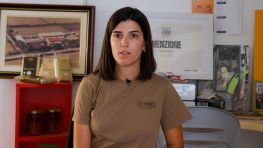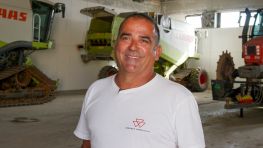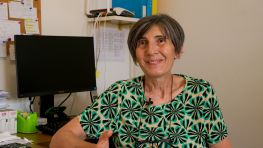 Rosalia Vacca and the Dream of…
Rosalia Vacca and the Dream of… Rosalia Caimo Duc
The grooming method for organic Lomellina rice.
Rosalia Caimo Duc after graduating in agriculture, although not coming from a family of farmers, decides to devote herself to the cultivation of rice and opt for a method in her opinion more respectful of the environment and more stimulating from a professional point of view, preferring to the conventional system the biological one.
Her reference point, from which she drew part of the knowledge necessary to start organic farming, are the Cascine Orsine di Bereguardo, the first known example of post-Green Revolution organic rice farming.
The grooming technique, which she adopted, is the result of a research funded by the Lombardy Region and carried out by the National Rice Authority between 2007 and 2008. Rosalia's choice in favor of organic farming is connected to the observation of cycles of nature and the desire to avoid methods that treat the earth as an inert substance.
Today the Terre di Lomellina company, headed by Rosalia, is part of a vast network of organic rice producers who strongly believe in a process of transformation of the rice production chain, mutually supporting each other and encouraging the accession of new members through sharing not only of knowledge but of sales channels and equipment.
Video table of contents
- The choice for organic rice cultivation: how I learned.
- The first years: conventional with a contractor. An industrial crop where the soil is an inert. Then the choice for organic started by a reflection on the ability of nature to generate life without human intervention.
- Organic farming makes the difference in the field, generating a healthier environment but also on the plate.
- The effects on the environment: the ISPRA report on the state of water and the positive effects of organic agriculture.
- The need to enhance the product.
- Collaboration with other organic farmers and mutual support. Beyond isolation and mistrust.
- Rice must be sold by building a relationship of trust based on transparency with the customer.
- A beautiful, non-standardized agriculture that puts you to the test.
- From conventional to organic farming: conversion difficulties.
- The best varieties to grow and the problem of brusone.
- Evidence of varieties resistant to brusone.
- From two companies in Lombardy to about twenty companies on the network: the future will depend on policies. With investments, techniques will be refined and productivity and therefore economic sustainability would improve.
- The recovery of processing residues.
- The limit of drawing on the past: times have changed, there are no longer any animals on the farm.
Interview information
Country: IT
Region: Lombardia
City: Candia Lomellina
Suburb: Via Roma 72
Rosalia Caimo Duc
Date of birth: 08-22-1961
City: Novara
School: University
Profession: Farmer
Languages: Italiano
Document by: Luca Ghiardo
Video by: Luca Ghiardo
Created: 28-01-2022
Questo video fa parte del seguente archivio
Rice stories
Rice stories
Food is a fundamental resource for man and his health, both through the supply of nutrients and the ability to embody traits of human culture that play a leading role in our well-being.
Over time, each territory has built original ways in which to relate to the fruits of its land, enriching them with rituals, symbolic meanings and culinary customs. Much of these relationships have been lost following the years of the economic boom, with the exodus from the countryside to urban centers, with the advent of agriculture for mass production and ultimately with the globalization of markets and the consequent impoverishment of the heritage of biodiversity and ethnodiversity.
The purpose of this archive is to collect evidence relating to the main rice production area in Europe, that is the Po Valley, and to investigate, through the analysis of textual sources and testimonies collected in the field, both what survives of this heritage, and the ways in which which has evolved and reached us, paying particular attention to the explicit and implicit links that bind food and health.






